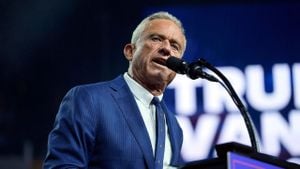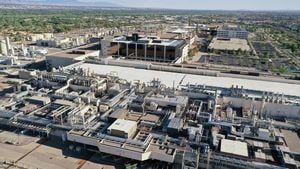With the 29th UN Climate Change Conference of Parties (COP29) officially underway, the world watches as nearly 200 nations convene to negotiate climate financing, aiming for commitments potentially worth trillions of dollars. The stakes are high, especially for developing countries like Pakistan, which is at the frontline of climate impacts yet struggles to secure the funding necessary for effective climate action.
At this year’s summit, held from November 11 to 22 in Baku, Azerbaijan, the main objective is clear: to broker significant financial agreements to support climate projects worldwide. Pakistan's Prime Minister, Shehbaz Sharif, has advocated for turning COP29 from just any summit to what he calls the "Finance COP," emphasizing the need for increased climate finance to tackle the pressing challenges faced by vulnerable countries.
Sharif highlighted at the World Leaders’ Climate Action Summit the urgency of fulfilling previous financial pledges made during COP27 and COP28, which many nations have yet to realize. He did not mince words about the need for more substantial commitments, stating, "Without climate justice, there can be no real resilience," urging wealthier nations to recognize their part in the climate crisis and contribute more than mere words.
Recent data highlights Pakistan's vulnerability, ranking fifth on the Global Climate Risk Index. The devastating floods in 2022, which affected over 33 million people and inflicted economic losses exceeding $30 billion, serve as stark reminders of the consequences of inadequate funding and support.
According to estimates, developing countries will require around $6.8 trillion by 2030 for climate adaptation and emission reductions. Despite the high demand, historical funding patterns reveal a troubling inequity: major economies like the United States and China have received disproportionate shares of climate-friendly investments, leaving regions such as Africa with only 2% of global renewable energy investments over the past two decades.
Sharif pointed out, "We believe COP29 can transform the way climate pledges function, potentially shifting to grant-based financing to ease the debt burden on vulnerable nations." By emphasizing grant-based support over loans, developing countries could potentially cultivate resilience without compounding their existing financial challenges.
Looking back, the commitment made by wealthy nations to provide $100 billion annually to help developing countries transitioned to clean energy was only fully met last year, illustrating the gap between promises and realization. Now, as those commitments expire, negotiators contemplate new benchmarks for future funding, but apprehensions loom large with upcoming elections, especially the prospect of Donald Trump taking office again, which could sway U.S. climate contributions drastically.
Discussion at COP29 isn't just about cash flows, but which nations should be obligated to provide financial support. Traditionally, only wealthier nations were on the hook, but there are voices rising to demand contributions from rapidly developing powers like China and various Gulf oil countries. Beijing, claiming its developing status, has been exercising caution over these new expectations, resisting calls for direct financial commitments.
While the negotiations on climate finance gear up, the outcome at COP29 seems pivotal. With talks likely heading toward a multi-layered target model incorporating contributions from various sources, the summit sets the stage for collective effort versus individual nation goals.
Simon Stiell, UN Climate Chief, remarked, "This summit provides us the necessary platform to outline specific actionable steps" but also recognized the potential roadblocks involved, noting the consequence of failing to secure substantial funding. Without the necessary financial backing, countries may struggle to uphold ambitious commitments, leading to watered-down climate action plans.
The specter of the COVID-19 pandemic adds another layer of complexity to the situation, as many nations are still grappling with its aftermath. For these countries, the feasibility of launching significant climate initiatives without external support remains unclear.
Meanwhile, protests from climate activists are gaining momentum outside the conference halls. Many question the effectiveness of such summits, asserting the time for dialogue has passed, and action is needed now. For them, attending COP29 feels like going through the motions rather than making substantial progress against the backdrop of increasingly severe climate events. Some critics have suggested this year's venue itself—Baku—symbolizes the inconsistencies at play, as it is known for its own environmental issues. Activists reflecting on their experiences feel the urgency to raise awareness and hold leaders accountable.
Watchful eyes from across the globe are on these negotiations, as the decisions made will not just affect the livelihoods of millions today, but the health of the planet for generations to come. Will COP29 be the turning point for climate funding, or merely another discussion with limited outcomes? The next few weeks will be telling, and as negotiations continue, the world waits with bated breath, hoping for commitments as impactful as the challenges they seek to address.



